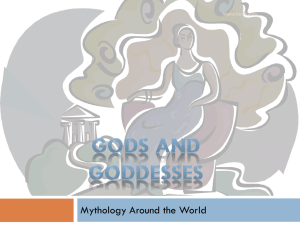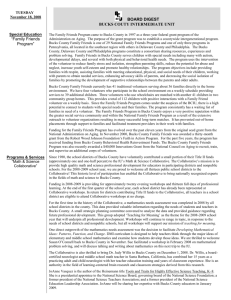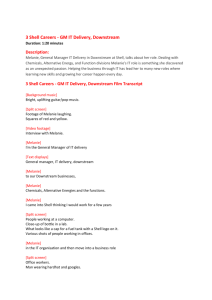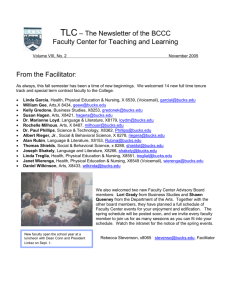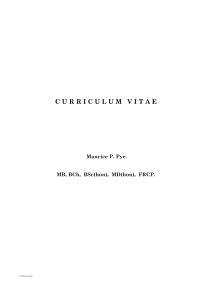Melanie Parris and Patricia Pye
advertisement
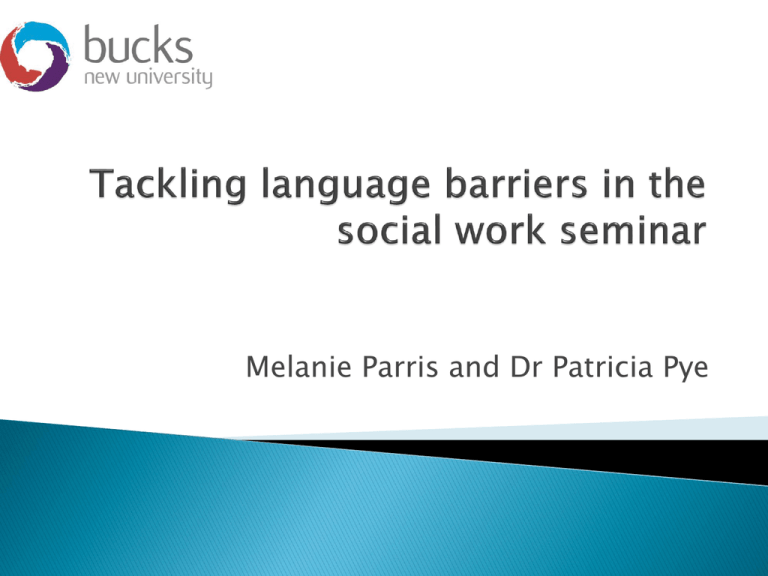
Melanie Parris and Dr Patricia Pye Melanie Parris, Senior Lecturer in Social Work, Bucks New University Dr Pat Pye, Study Skills Tutor, Bucks New University Internationalization of UK education Social Work Task Force and Social Work Reform Board: drive to improve standards within the profession Diverse nature of Social Work student intake at Bucks New University The initial study was carried out in 2010/2011 by Melanie and Pat Funded by Bucks New University Learning Enhancement Project (LEPS) A second funded study was carried out in 2012/13 to determine whether the results of the first study were replicated with a further student cohort Sample for both studies comprised 20 final year BSc (Hons) Social Work students 14 students originally from Zimbabwe I student originally from Pakistan 1 student originally from the Democratic Republic of Congo 1 student was born in the U.K. 3 students originally from Kenya 15 female and 5 male students Age range between 22 and 49 years All resident in the U.K. for a minimum of 7 years Individual semi-structured interviews carried out by Melanie using a questionnaire Pilot survey prompted modifications to questionnaire Interviews transcribed verbatim by a speech to text reporter Data thematically analysed Systematic literature review conducted by Pat Three major themes: Culture, attitudes and values Language barriers, group-work and perceptions of success Take-up of support Overarching themes of loss and opportunity 1. Lack of linguistic confidence 2. Time needed to attune to the difference between the grammatical English of textbooks and idiomatic English in context (the ‘rules versus the reality’) 3. ‘Self-censorship’ (Hyde and Ruth, 2002) 4. Time needed to become fluent in, to use Gee’s (2008) terms, a ‘secondary discourse’ 5. Encountering a culture which may devalue bilingualism and associate less fluent powers of expression with poor powers of thought (Harrison, 2006) It is important not to merely interpret a lack of participation in cultural terms (e.g. students from some cultures may be perceived as quiet or ‘passive’ learners) In our study, participants mentioned selfconsciousness about their accents and comparative lack of fluency. ‘Lack of confidence and poor language skills are a primary limitation on the articulation of questions and answers in an open setting such as a classroom or a public discussion’ (Valiente, 2008, p.81). ‘So I am quiet in class .. sometimes you don’t find the words to express yourself when you have other students that …have that extra… they’ve got a positive of English as their own first language and they are more confident in that.’ Students with ESL may encounter a mismatch between their own assessment of linguistic skill and the views of others. The range of idiomatic English used by their peers can be bewildering. Students are then dismayed to be referred for language support (Schmitt, 2005). Participant comment: ‘In Zimbabwe it [English] is the official language…But.. there are nuances in language …you can imply certain things that people from a different culture don’t know…those kind of things need to be taken into consideration’. In multi-cultural group-work, Social Work students need to feel free to express ideas. Research by Hyde and Ruth (2002) in the USA suggests students may ‘self-censor’ for fear of raising racially or culturally sensitive issues. The expression of these issues requires a familiarity with the cultural and social nuances of language. ‘ One is not in a Discourse unless one has mastered it, and mastering comes about through acquisition, not learning …. ‘ (Gee, 2008, p.179). The Social Work student with ESL has to negotiate the gulf between their learned ‘primary discourse’ and the ‘secondary discourse’ of British HE. The Social Work teacher needs to recognise this challenge: ‘Teaching for acquisition alone leads to successful, but “colonized” students’ (Gee, 2008, p.179). Participant comment: ‘at times other students who were born here they don’t take your answer as valuable’. ‘Mono-lingualism’ is often valued more than ‘bilingualism’ in the social work academy (Harrison, 2006). New Social Work students need to be encouraged to see bilingualism as a cultural advantage which can enhance seminar discussions. ‘There are certain ideas that because you speak with an accent, you think with an accent, you work with an accent’ (comment from primary research undertaken by Harrison, 2006, p.407). Participant comment from our own research: ‘it’s … a complex, feeling a bit inferior because English is not your first language …It’s just that you might not express it as fluent as they can, it doesn’t mean that you don’t know’. Change terminology of language ‘support’ (see Peelo and Luxon, 2007) Practical support: allow extra time for note-making etc. (see Smailes and Gannon-Leary, 2007) Take a bilingual perspective, valuing multilingual environments (Harrison, 2006) Use language itself as the focus for a seminar: for example, a discussion of idiomatic English expressions may be related to intrinsic socio-cultural values. Greater awareness of the centrality of communication to social work practice (Parris, 2012) . Gee, J.P. (2008) Social linguistics and literacies: ideology in discourses. 3rd ed. London: Routledge Harrison, G. (2006) Broadening the conceptual lens on language in social work: difference, diversity and English as a global language. British Journal of Social Work. 36, pp.401-418 Hyde, C.A. and Ruth, B.J. (2002) Multi-cultural content and class participation: do students self-censor? Journal of Social Work Education. 38 (2), pp.241-256 Parris, M. (2012) An introduction to social work practice: a practical handbook. Maidenhead: Open University Press Peelo, M. and Luxon, T. (2007) Designing embedded courses to support international students’ cultural and academic adjustment in the UK. Journal of Further and Higher Education. 31(1) , pp.65-76. Schmitt, D. (2005) Writing in the international classroom. In: Carroll. J. and Ryan, J. (eds) Teaching international students: improving learning for all. London: Routledge, pp.63-74 Smailes, J. and Gannon-Leary, P. (2007) Inclusive approaches in learning and teaching. Widening Participation and Lifelong Learning. 9 (1), pp.37-47 Valiente, C. (2008) Are students using the ‘wrong’ kind of learning?: A multi-cultural scrutiny for helping teachers appreciate differences. Active Learning in Higher Education . 9 (1), pp.73-91 We can be contacted at: Melanie Parris: melanie.parris@bucks.ac.uk Pat Pye: patricia.pye@bucks.ac.uk





